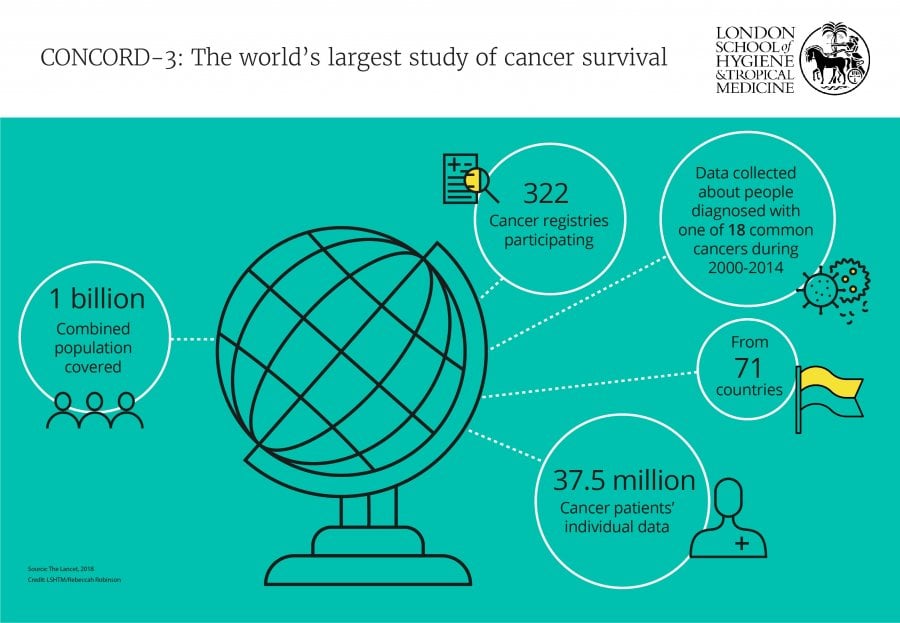UK ranks poorly for deadliest cancer survival
12 February 2020 London School of Hygiene & Tropical Medicine London School of Hygiene & Tropical Medicine https://lshtm.ac.uk/themes/custom/lshtm/images/lshtm-logo-black.png
CONCORD-3: The world's largest study of cancer survival
CONCORD is the global programme for the worldwide surveillance of cancer survival. The latest data from this programme, CONCORD-3, recorded global five-year survival for patients diagnosed with cancer over the 15 years between 2000 and 2014, enabling international comparison of trends in the overall effectiveness of health systems in dealing with cancer.
The UK ranked 14th for cancer of the oesophagus, 21st for liver, 22nd for brain, 25th for pancreatic, 26th for stomach and 27th for lung.
Together, these six cancers make up half of all deaths from common cancers in the UK, but just under 16% of people with less survivable cancers can expect to live more than five years after diagnosis, after other causes of death are taken into account.
The Less Survivable Cancers Taskforce (LSCT) has recently presented these data at the House of Commons, calling on the UK government to commit to tackling the stark inequalities in cancer outcomes and aiming to double the survivability of these cancers by 2029. LSCT is pushing for new investment in research, a focus on earlier diagnosis and better and faster pathways to treatment for patients.
Professor Michel Coleman, who leads the Cancer Survival Group at the London School of Hygiene & Tropical Medicine, said:
“Although our data show that global cancer survival has generally increased, survival trends vary widely, with large disparities between cancer types.
“The reasons for poor five-year survival for some cancers are complex. We need to gain a greater understanding of the symptoms and signs that we enable earlier diagnosis for the less survivable cancers, and fund the vital research that helps improve prevention, early diagnostic techniques, and treatment.
“We are very glad that the Less Survivable Cancers Taskforce has found the results of our research useful in advocating for research and investment to improve the outcomes for the patients they represent”
Data adapted from Allemani et al. Global surveillance of trends in cancer survival 2000–14 (CONCORD-3): analysis of individual records for 37 513 025 patients diagnosed with one of 18 cancers from 322 population-based registries in 71 countries. The Lancet. DOI: 10.1016/S0140-6736(17)33326-3
Note that only countries with age–standardised data were taken into account. Comparison tables here.
If you enjoyed this article and would like to build a career in global health, we offer a range of MSc programmes covering health and data, infectious and tropical diseases, population health, and public health and policy.
Available on campus or online, including flexible study that works around your work and home life, be part of a global community at the UK's no.1 public health university.